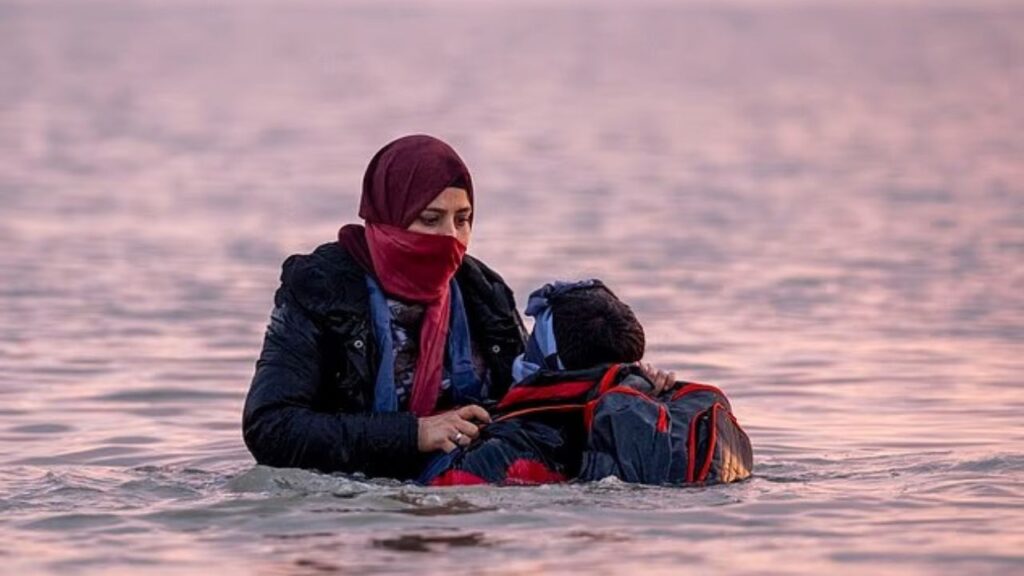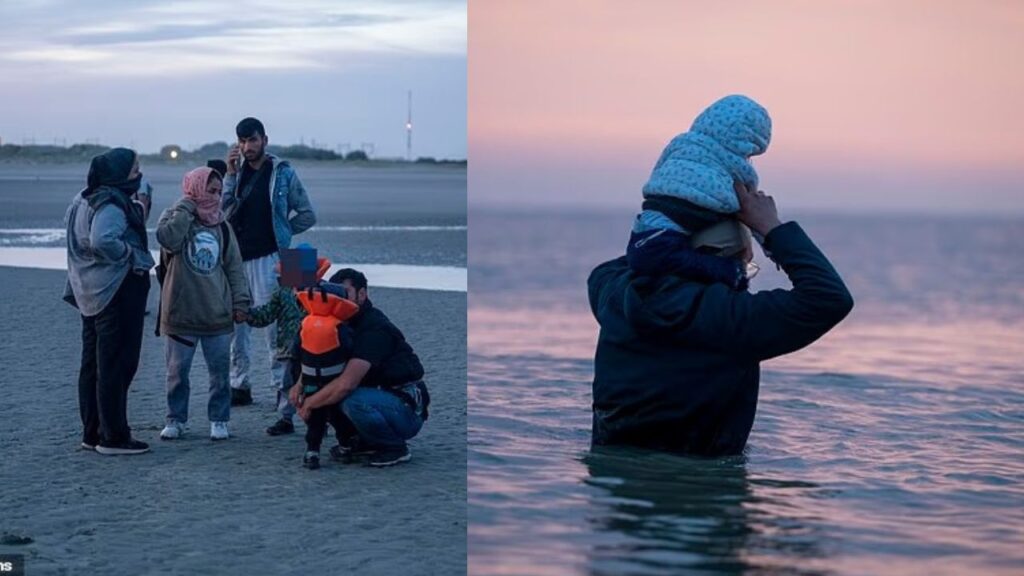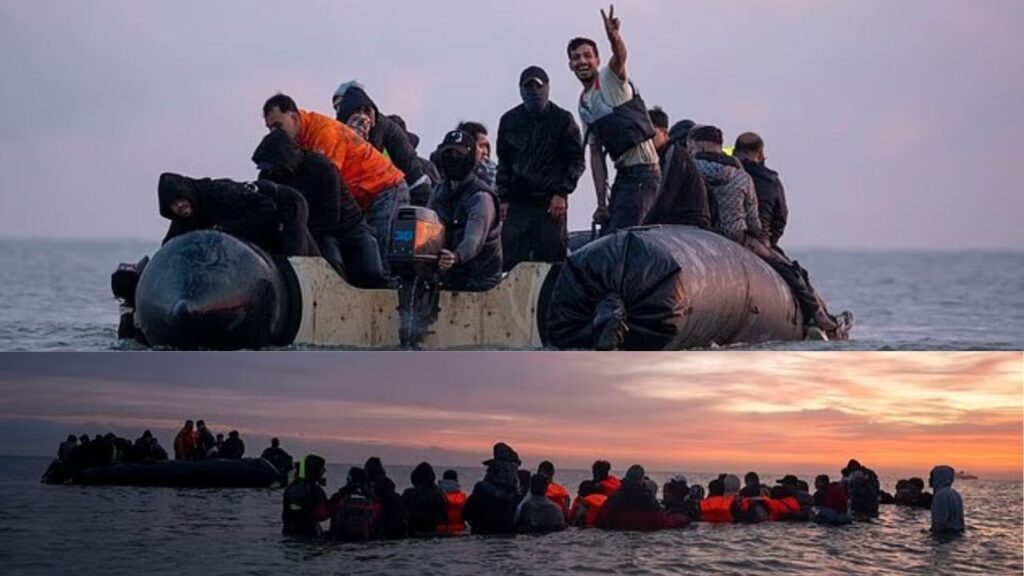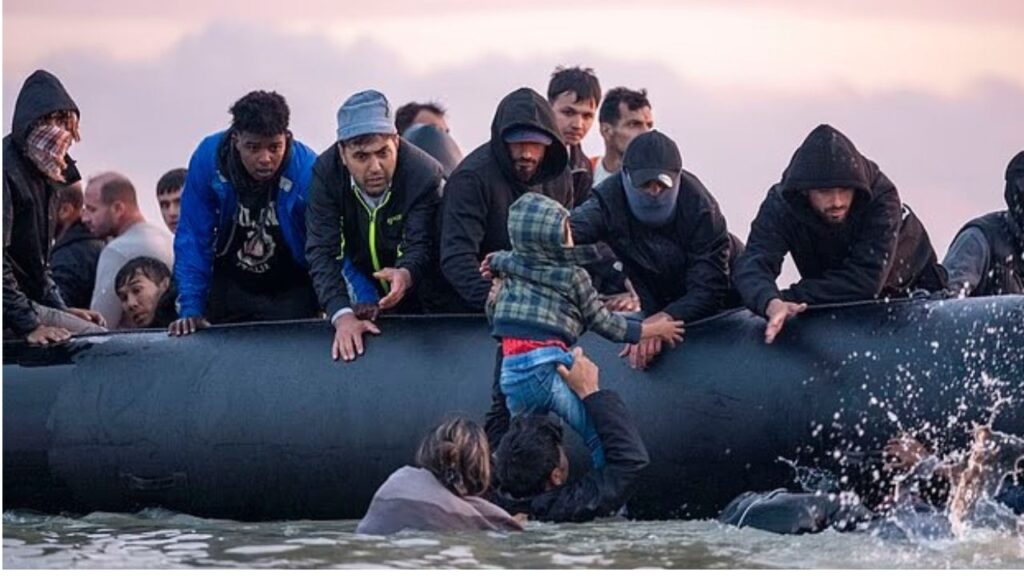Dozens of Men, Women and Children Wade Into Channel Waters as New Detention Policy Begins
French police officers stood watching from Gravelines beach this morning as dozens of migrants, including young children, loaded onto rubber dinghies bound for the UK, highlighting the ongoing challenge facing Labour’s new “one in, one out” immigration scheme.
Dramatic Sunrise Scenes Show Families Preparing for Dangerous Journey
The remarkable scenes captured at sunrise showed passengers gathering on the sand before wading into knee-deep water, with many carrying toddlers and most wearing lifejackets for the perilous Channel crossing. Families could be seen clasping hands and embracing before swimming and wading out to the overcrowded vessels.

Some migrants threw peace signs at photographers while French gendarmerie vehicles remained stationary on the beach, with one officer appearing to look at his phone as the illegal crossing unfolded just east of Calais.
The densely packed boat, with young men sitting astride the vessel’s edge, eventually departed into the English Channel, passing close to another vessel before disappearing into the distance. Those left behind watched as the first boat began its dangerous journey toward the UK coast.
First Migrants Detained Under New Government Policy
The crossing comes after the Home Office confirmed that the first small boat migrants were detained in Dover on Thursday for removal to France under the Government’s controversial new scheme. Selected migrants will be held in detention facilities rather than placed in taxpayer-funded asylum hotels while awaiting removal.
Home Secretary Yvette Cooper announced that migrants detained at Dover’s Western Jet Foil terminal would be held until they could be returned to France, describing the measures as “groundbreaking” and designed to undermine criminal gangs’ business models.
Conservative Opposition Slams Scheme as ‘Gimmick That Won’t Work’
Shadow Home Secretary Chris Philp launched a scathing attack on Labour’s policy, describing it as ineffective and predicting it would become mired in legal challenges.
“As far as we can see, removals under this scheme will only amount to six per cent of arrivals, meaning 94 per cent will stay,” Philp stated. “It will have no deterrent effect whatsoever.”
He highlighted significant loopholes in the Franco-British agreement, noting that migrants claiming to be under 18 or making modern slavery or human rights claims cannot be removed, warning the plan would “get bogged down in an endless legal quagmire.”

Former Cabinet Ministers Denounce Anglo-French Deal
Former Conservative Cabinet minister Sir Jacob Rees-Mogg delivered harsh criticism of the deal announced by Prime Minister Sir Keir Starmer and French President Emmanuel Macron on July 10.
“It’s a fake. It’s a phony, it’s a cheat on the British people,” Rees-Mogg declared on GB News. “It’s a bogus deal, it’s a complete waste of time. There’s an extraordinary loophole that means almost no one can be deported.”
Human Rights Claims Threaten to Undermine Removal Process
Legal complications have already emerged regarding the scheme’s implementation. The treaty stipulates that migrants cannot be sent back to France if they have “an outstanding human rights claim,” with the Home Office confirming that some human rights cases will block removal until fully concluded.
Culture Secretary Lisa Nandy initially suggested human rights claims would be heard after migrants were returned to France, but officials later clarified that certain types of claims would prevent removal entirely, creating potential delays and legal challenges.
Pro-Migrant Groups Prepare Legal Challenge
Sources revealed that pro-migrant organizations have begun informal discussions about launching joint legal action against Labour’s plan, similar to challenges mounted against the previous Conservative government’s Rwanda asylum scheme.
The Free Movement website, which advises immigration lawyers, published analysis suggesting that while legal challenges would be more difficult than those against Rwanda, grounds still exist for resisting removal to France, including cases involving UK family connections or negative experiences in France.
Two-Way Migration System Launches Alongside Returns Policy
As part of the reciprocal arrangement, Britain will accept migrants from France in exchange for small boat arrivals. This element also began Thursday, with migrants able to lodge “expressions of interest” through a specially-created Home Office website.
PM Defends Policy Despite Criticism
Despite the scheme’s narrow scope and likely expiration in less than 11 months, Prime Minister Starmer maintained his position on social media, stating: “If you break the law to enter this country, you will face being sent back. No gimmicks, just results.”
Home Secretary Acknowledges Long-Term Challenge
Yvette Cooper recognized the complexity of the task ahead, stating: “Criminal gangs have spent seven years embedding themselves along our border and it will take time to unravel them, but these detentions are an important step towards undermining their business model.”
She emphasized that the pilot scheme would develop over time, claiming it represented progress toward “what no other government has done since this crisis first started – sending small boat arrivals back to France and strengthening our borders.”
Continued Crossings Despite New Measures
The ongoing scenes at Gravelines demonstrate that the new policy has yet to deter migrants from attempting the dangerous Channel crossing. Shadow Home Secretary Philp posted videos Wednesday showing migrant boats bound for the UK coast, escorted by French vessels, on the first day the new agreement took effect.
The images of French police passively observing the morning’s crossing while migrants, including young families, risked their lives in overcrowded dinghies, underscore the persistent challenges facing both governments in addressing irregular migration across the Channel.

Legal Battle Looms for Implementation
With pro-migrant groups analyzing treaty details and preparing potential legal challenges, the Home Secretary appears likely to face significant legal battles to achieve the first removals under the new system. The complexity of human rights assessments and the scheme’s various exemptions may prove substantial obstacles to the policy’s effectiveness. The scheme’s success will ultimately depend on overcoming these legal hurdles while maintaining the political will to continue what critics have already labeled as an inadequate response to the ongoing migration crisis.






